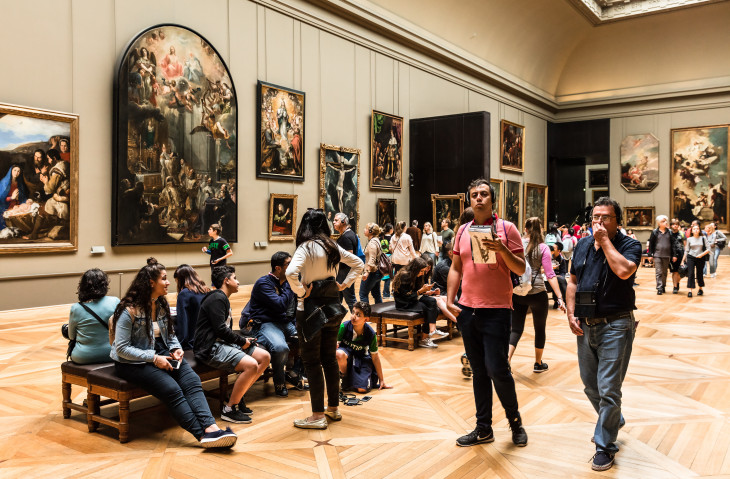It is common for curators to specialize in one particular time period. The majority of curator, archivist or conservator positions require a minimum of a master's degree that is related to their field of work. Individuals commonly gain experience by volunteering in museums and archives. A bachelor's degree is required by museum technicians.
Education & Training
Curators: Many museum curators have a master's degree in a discipline that reflects the specialty of the museum including: archaeology, history, museum studies or art. Certain employers prefer their curators have some kind of doctoral degree. This is often required for positions in science and natural history positions. Candidates who earn 2 graduate degrees, in a specialized subject and in museology or museum studies may have a competitive edge when looking for work.
Curator positions may be available in smaller museums for individuals who have a bachelor's degree. It is common for curators in smaller museums to have managerial and administrative responsibilities. Courses in the following are recommended: public relations, fundraising, business administration, marketing, and public relations. Applicants are required to have completed museum practices courses along with an internship of full-time museum work.
Archivists: Many employers want their candidates to have a graduate degree in any of the following: records management, history, archival science and library science. Numerous universities and colleges offer practical training or courses pertaining to archival techniques in library science, history or other similar programs. Certain institutions offer master's degrees in archival studies. Candidates are often required to have knowledge in the following: medicine, computer science, collection discipline or business. Volunteer internships are offered by numerous archives in order to allow students the chance to gain experience.
Museum Technicians (Registrars): Typically, registrars are required to have a bachelor's degree related to the museum's specialty. Previous work experience in museums, experience designing exhibits and training in museum studies are assets. Not many schools offer a bachelor's degree in museum studies. It is more common to become an undergraduate minor. Undergraduate degrees in related subjects include: art history, archaeology or history are popular. Some may wish to pursue a master's degree in museum studies; however, many institutions feel that museum work experience and knowledge of the museum's specialty is more vital.
Conservators: Conservators are required to have substantial experience and a master's degree in conservation or similar related field. Since there are few graduate programs specializing in museum conservation techniques; competition is strong for entry. Qualifications include: work experience, a background in archaeology, chemistry, art history and studio art. Knowledge of a foreign language is helpful for admission to certain programs. Enhance admission prospects by completing a conservation internship as an undergraduate. The last years of graduate programs include internship training.
Licenses, Certifications, and Registrations
Voluntary certification for archivists may be obtained through the Academy of Certified Archivists. Those with a master's degree and minimum of one year professional archival experience can pass an exam to receive their Certified Archivist designation. Certification must be periodically renewed by fulfilling continuing education programs or by re-taking the exam. Check with future employers to see if certification is required.
Skills and Qualities that will Help
Analytical Skills: Curators, conservators, archivists and registrars require fantastic analytical skills in order to determine the history, origin and importance of a variety of objects they work with on a regular basis.
Computer Skills: Great computer skills are vital for archivists as they develop and utilize complex databases related to the materials they access and store.
Customer-Service Skills: Registrars, curators and archivists work together with the general public on a consistent basis. They need to be friendly and courteous in order to help users find suitable materials.
Organizational Skills: It is necessary for conservators, archivists, registrars and curators to be able to store and retrieve documents and records. It is important to develop adequate storage systems for the public to utilize.
Technical Skills: Numerous historical objects need to be preserved and analyzed. Conservators need to preserve a variety of precious objects by using appropriate techniques and associated chemicals. Pottery, documents, fabrics and paintings are popular examples.
How To Advance
There are numerous continuing education options including: conferences, meetings and workshops sponsored by historical, archival and museum associations. Certain large organizations including the U.S. National Archives and Records Administration offer training in-house.
There may be limited opportunities for promotion in small archives or those that are maintained by one individual. Advancement often occurs with transferring to a larger archive that offers supervisory positions. Some advanced positions, including director of state archive require a doctorate in library science, history or a related field.
Various layers of responsibility may be available for advancement in larger museums. Individuals may eventually become a director of the museum. Curators typically start in regional establishments and smaller scale locations during the beginning of their careers. The chance to work at larger facilities comes as experience is gained. Top museum positions are competitive and extremely sought after. Producing published work and performing unique research is vital to advancing in larger organizations.









